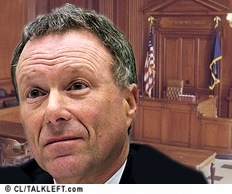Where did all the outrage come from? In my view at the time:
It has little to do with Libby and everything to do with Bush, special treatment and the federal sentencing system that applies to everyone else in America.
Why the outrage against Bush?
President Bush, with the stroke of a pen, wiped out Libby's prison sentence. He didn't reduce it. He eliminated it.
Why? Because in his view, the sentence was too harsh. He thought the Judge calculated Libby's guidelines at too high a level. He thought the Judge should have granted Libby a departure from the guidelines. Because he disagreed, because he is President, because Scooter Libby is in his elite circle, he threw the law out the window. He didn't reduce the sentence to a lesser term of imprisonment. He didn't wait for the Court of Appeals to decide if Judge Walton was right or wrong. He didn't wait for the system to run its course. Instead, because he didn't want Scooter Libby to spend even a single night in prison, he intervened and set Libby free.
The hypocrisy:
He made this decision just weeks after he had the Attorney General send his minions to Congress to argue that every federal offense should carry a mandatory minimum sentence from which a Judge cannot depart. In other words, for every other defendant in America, Bush wants to preclude judges from exercising discretion and require them to sentence according to a mathematical formula. Libby, on the other hand, gets a free pass because the Judge didn't exercise the discretion Bush thinks Judges in other cases ought not to have.
With that one stroke of the pen, Bush trivialized and rendered meaningless the hard work of Judge Walton, the D.C. Circuit Court of Appeals, the prosecutors and the probation officer. He told them it didn't matter how much time they spent analyzing the facts or the law or even whether they were right or wrong. He could care less what the law held. He thought differently and that's all that mattered.
The politics of crime:
For every other defendant, prosecutor, judge and defense lawyer around the country, his action says something more: The law doesn't apply if the defendant has a good enough connection to the President -- and only if the defendant has a connection to the President.
Every other defendant be damned. Their families and children can suffer, their lifetimes of good works can be overlooked. So what if they have medical issues or they committed only a single act of criminal behavior in an otherwise unblemished life? For them, the Guidelines and mandatory minimums will continue to apply and they will be separated from their families and lose their jobs while they wait in prison for the Court of Appeals to rule on whether their judge was right or wrong.
All the while, Bush and his henchman Alberto Gonzales will do everything in their power to lean on Congress to pass more laws reducing the ability of federal judges to use their independent judgment.
My clients and the clients of every other defense lawyer in the country will continue to go to jail and serve sentences that are far harsher and more unfair than the one handed down to Scooter Libby, and they'll just have to play by the rules.
And, that's why I'm so mad.
Scooter Libby seems so irrelevant today. But it's worthwhile revisiting the details of his case, if for no other reason than to remind ourselves of the inequities between the powerful and the powerless in our criminal justice system.
I have no problem with Libby's civil rights being restored. It should be automatic upon completion of one's sentence. And he still has a felony conviction. I wonder if Virginia will also restore his law license.




